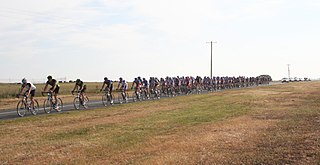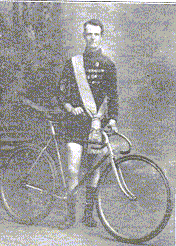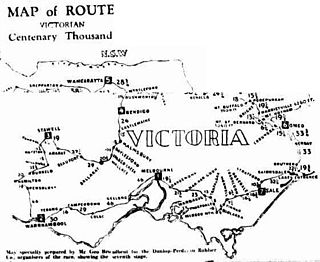Related Research Articles

Sir Hubert Ferdinand Opperman, OBE, referred to as Oppy by Australian and French crowds, was an Australian cyclist and politician, whose endurance cycling feats in the 1920s and 1930s earned him international acclaim.

The Melbourne to Warrnambool Classic cycling race is a one-day road bicycle race. The race started in 1895 and is Australia's oldest one day race and the world's second oldest one day race, after the Liège–Bastogne–Liège Classic. Historically until 1938 the race started in Warrnambool and finished 165 miles (266 km) later in Melbourne. In 1895 the race was run in the opposite direction, from Melbourne to Warrnambool and then again from 1939. The route started in central Melbourne and followed the Princes Highway to Warrnambool on Victoria's western coast. This traditional route was the longest race on the Union Cycliste Internationale (UCI) calendar, the exact distance varying slightly over time.

The Australian National Road Race Championships, are held annually with an event for each category of rider: Men, Women & under 23 riders. The event also includes the Australian National Time Trial Championships since 2002. The Australian Championships were officially known as the Scody Australian Open Road Cycling Championships from 1999 to 2010, taking the name of their main sponsor. This changed to the Mars Cycling Australia Road National Championships from 2011 but they are more commonly referred to as The Nationals. The under 23 championships were introduced in 2001. Note that these results do not currently include the senior and junior amateur road race championships that were held prior to the open era.

Paul Chocque was a French professional road bicycle racer. He won a silver medal at the 1932 Summer Olympics in team pursuit event.

Hilton Clarke is an Australian former professional cyclist. Born in Ormond, Clarke became a professional in 2001. He was introduced to the sport by his father Hilton Clarke, an Olympic cyclist, at the age of 9.
Barry Waddell is one of Australia's best-known cyclists of the 1960s. Waddell won a record 5 straight Herald Sun Tours from 1964 to 1968. Although best known as a road cyclist, Waddell was in fact an "all-rounder", having also won a number of national track titles. He won the Australian national road race title in 1964 and 1968. He won the General Classification in the Herald Sun Tour five years in a row (1964-1968) when the Sun Tour was at its most gruelling, covering 1200 miles (1920 km) in nine days. Waddell took fastest-time honours in the Melbourne-to-Warrnambool road race no fewer than three times and won the Sir Hubert Opperman trophy twice, breaking Opperman's record from Adelaide to Melbourne. Subsequently, after his professional cycling career had finished, he also won the 1975 world veterans' title in Austria.
Graeme Gilmore is an Australian retired track cyclist. He is the father of Belgian racing cyclist Matthew Gilmore and brother in law of British racing cyclist Tom Simpson.

Richard William "Fatty" Lamb was an Australian racing cyclist who competed on both road and track, as was typical of Australian cyclists of the era such as Hubert Opperman. Throughout his career, Lamb was associated with Malvern Star Bicycles and Bruce Small.
Iddo "Snowy" Munro was an Australian racing cyclist. The highlights of his career were winning the Australasian long distance road championship in 1909 and competing in the 1914 Tour de France. Munro won the championship by winning the Blue Riband for the fastest time in the Warrnambool to Melbourne race. Munro set a record time of 7h 12' 51" which was not broken until 1931. Munro had a long association with the Warrnambool and his other efforts were 30th in 1907, 45th and fastest rider receiving over 10 minute start in 1908 and 60th in 1910.
Alby Barlow was an Australian racing cyclist from 1935 who road for Oakleigh. In 1947 he was the Australian 100 miles road champion and holder of the 25, 50 and 100 miles Australian unpaced road records
Keith Rowley (1919–1982) was an Australian racing cyclist.
Eddie Smith was an Australian racing cyclist. He won the Australian national road race title in 1954 and 1955. Smith finished second in 1956 behind Russell Mockridge.
Walter "Hefty" Stuart (1912–1938) was an Australian cyclist who competed on both road and track, as was typical of Australian cyclists of the era such as Hubert Opperman and Richard Lamb.
Max Rowley was an Australian racing cyclist.
Tom Larcombe (1881-1967) was an Australian racing cyclist with notable success in long distance road races.
Ernest "Ernie" Bainbridge (1890–1984), also known as Ern Bainbridge, was an Australian racing cyclist, who is best known for competing in the 1928 Tour de France with fellow Australian Percy Osborn and Hubert Opperman and New Zealander Harry Watson.

Duncan "Don" Kirkham was an Australian racing cyclist. Kirkham was a regular competitor in Australian long distance cycling races. He won the Goulburn to Sydney Classic in 1910, riding off scratch and setting the fastest time. In 1911 he was 2nd and set the fastest time, riding the 131 miles (211 km) in a record time of 6h 19' 31". Kirkham's time was not beaten until 1925 by Richard "Fatty" Lamb. He had previously finished 5th in 1909. and finished outside the top 20 in 1912.
John Beasley was an Australian racing cyclist and rode in the 1952 and 1955 Tour de France.
Alan "Pete" Angus (1912–1988) was an Australian racing cyclist.

The Centenary 1000 cycling race was a one-week road bicycle race over seven stages covering 1,102 miles (1,773 km). The race was run in 1934 as part of the celebrations of the Centenary of Victoria. The race was originally conceived along the lines of the Dunlop Grand Prix, won by Hubert Opperman then aged 23, by 1h 20' and the concept for the race was covering 1,000 miles (1,600 km) with prizes exceeding £1,000, including a climb over Mount Hotham.
References
- ↑ "Branchflower Wins Bike Tour". The Sporting Globe . Melbourne, Vic.: National Library of Australia. 27 September 1947. p. 3.
- 1 2 3 4 "Bonney rewarded with win in classic". The Age . Melbourne, Vic.: National Library of Australia. 10 October 1949. p. 12.
- 1 2 "Sick Victorian Rider Wins 125-Mile Title". The Examiner . Launceston, Tas.: National Library of Australia. 14 September 1953. p. 13.
- 1 2 "Records topple in fast Warrnambool". The Sporting Globe . Melbourne, Vic.: National Library of Australia. 3 October 1953. p. 12.
- ↑ "FCC Criterium Fixture 2010" (PDF). footscraycc.com.au. Archived from the original (PDF) on 23 July 2015.